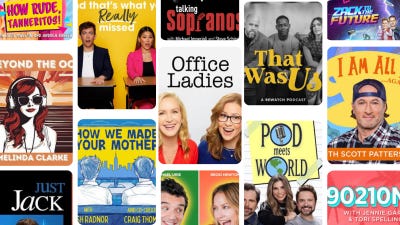Celebrities, Stop Taking Our Jobs
Celeb-hosted TV recap podcasts are fun — but also signify a worrisome problem.
Here are the words that broke me: How We Made Your Mother.
And when I say “broke,” I mean tipped from annoyed to actively angry. How I Met Your Mother’s Josh Radnor and the show’s co-creator Craig Thomas are joining the exhaustive list of people revisiting their popular TV series via recap podcasts. And reading that HIMYM was the latest show to jump on the bandwagon filled me with rage.
Which sounds silly, I know. But let me explain.
It’s not news that we are drowning in TV recap podcasts hosted by cast members: The Office (Office Ladies), This Is Us (That Was Us), Melrose Place (Still The Place), Will & Grace (Just Jack & Will), Glee (And That's What You REALLY Missed), Saved by the Bell (Zack to the Future) ... and I’ll just stop there. I counted close to fifty, and I’m sure there are even more.1
But how did we get to the point that nearly every TV series that aired in the past thirty years is getting the “today’s episode is brought to you by Squarespace” treatment? And why does this matter beyond the realm of podcasts? How does it, in fact, preordain a worrisome trend impacting journalism and critical thought?
After the paywall, subscribers will learn:
how TV recap podcasts started (with fans hosting!)
how the stars invaded
and what The West Wing and The Office took things to another level




